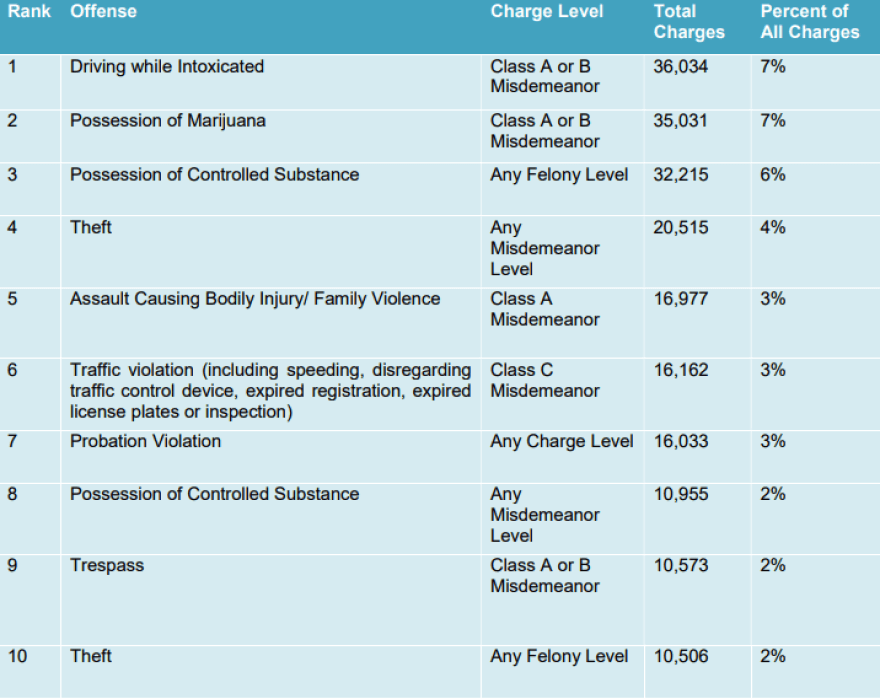Class A Misdemeanors in Texas
Contents
- Class A Misdemeanors in Texas
- Charged with a Class A Misdemeanor in Texas?
- What is a Class A Misdemeanor in Texas?
- Common Class A Misdemeanors in Texas
- What happens if you are Found Guilty
- Penalties for a Class A Misdemeanor in Texas
- What to expect during your court appearance
- Defenses for a Class A Misdemeanor charge
- How to choose a Criminal Defense Lawyer
- Hiring an Experienced Criminal Attorney
- FAQS Related to Texas Class A Misdemeanors
- What is the minimum sentence for a Class A misdemeanor in Texas?
- Can a Class A misdemeanor be dropped in Texas?
- Will I go to jail for a Class A misdemeanor first offense in Texas?
- Can you get probation for a Class A misdemeanor in Texas?
- What’s the worst misdemeanor you can commit?
- Is a Class A misdemeanor a felony in Texas?
- Do first-time offenders go to jail Texas?
- Can a first-time misdemeanor be dismissed in Texas?
- Can you buy a gun with a Class A misdemeanor Texas?
- What is the first chance program in Texas?
- What is the first time offenders program in Texas?
- Do you get good time in Texas state jail?
- What are the three most likely punishments for misdemeanors?
- What is the most common misdemeanor?
- Which misdemeanor is the least amount of punishment?
- Conclusion
In the state of Texas, Class A misdemeanors are considered some of the most serious criminal offenses. They carry penalties ranging from one year in jail to a fine of up to $4,000 or a combination of both. Examples of these types of offenses include burglary of a vehicle and carrying an unpermitted firearm. Those who commit such crimes can expect serious consequences, including the possibility of serving time in prison. It is important for all Texans to be aware that breaking laws of this nature can have serious legal repercussions and should not be taken lightly.
Charged with a Class A Misdemeanor in Texas?
Being charged with a Class A Misdemeanor in Texas can be a serious matter. The legal process can be confusing and overwhelming, and it can be difficult to know what to expect. Understanding the legal system and your rights is crucial in order to navigate the process successfully and make informed decisions.
In this post, we will guide you through what to expect when charged with a Class A Misdemeanor in Texas. We will cover:
- what a Class A Misdemeanor is,
- the potential consequences of the charge,
- and what to expect during the legal process.
Whether you’re facing a Class A Misdemeanor charge or are simply interested in learning more about the legal system, this post will provide you with the information you need to know.
What is a Class A Misdemeanor in Texas?
In Texas, there are three types of misdemeanors: Class A, Class B, and Class C. A Class A misdemeanor is the worst type of misdemeanor. This type of crime carries a maximum punishment of one year in jail and a fine of up to $4,000. Examples of Class A Misdemeanors in Texas include assault causing bodily injury, resisting arrest, theft of property worth between $750 and $2,500, and driving while intoxicated (DWI) with a blood alcohol concentration (BAC) of 0.15 or higher.

It’s important to note that even though a Class A Misdemeanor is considered a less serious crime than a felony, it still carries significant consequences, such as a criminal record that can affect your ability to find a job, obtain housing, or get a loan. It’s crucial to take this type of charge seriously and to seek the help of an experienced criminal defense attorney as soon as possible. A knowledgeable attorney can help you understand the charges against you, evaluate the strengths and weaknesses of the case, and create a strong defense strategy to protect your rights and minimize the potential consequences of a conviction.
Common Class A Misdemeanors in Texas
There are a range of misdemeanors classified as Class A offenses in Texas, with punishments varying depending on the severity of the crime. As such, it is important to understand what these misdemeanors involve and how they can be addressed. Here is a list of common Class A misdemeanors in Texas:
- Driving While Intoxicated (DWI): DWI with a BAC of 0.15 or higher is a serious offense in Texas and carries heavy punishments. The minimum jail time for a first-time offense is 72 hours, while a third-time conviction can result in up to 10 years in prison.
- Reckless Driving: An individual convicted of reckless driving may be fined up to $200 and may receive an additional 0-180 days in jail.
- Possession of Marijuana: Possessing less than 2 ounces of marijuana is a Class A misdemeanor in Texas punishable by a $4000 fine and up to one year in jail.
- Theft of Property (Over $2,500): This type of theft is considered a felony, with punishment ranging from two years in prison and a fine of up to $10,000.
- Assault: Assault is considered a misdemeanor if it results in bodily injury but no weapon was used. Punishment can include a maximum of one year in jail and/or a fine of up to $4,000.
- Fraud: Generally, fraud is punishable by up to 180 days in jail and/or up to a $2,000 fine. However, the punishment depends on the value of stolen property or services.
- Public Intoxication: A person found guilty of public intoxication may be fined up to $500 and receive an additional 30 days in jail.
Enhancements
Common Class A misdemeanors and the elements that might lead to enhanced penalties:
| Offense | Penal Code Section | Enhancement Elements |
|---|---|---|
| Assault causing bodily injury | Section 22.01(a)(1) | Prior conviction of the same offense; assault against a family member, public servant, security officer, emergency services personnel, or in retaliation |
| Theft (property <$750>$500) | Section 31.03(e)(2)(A) | Prior theft convictions |
| Burglary of a vehicle | Section 30.04 | Prior convictions for burglary of a vehicle |
| Carrying a weapon unlawfully | Section 46.02 | Carrying on premises where prohibited; prior felony conviction |
| Possession of marijuana | Section 481.121(b)(1) HSC | Possession in a drug-free zone; prior drug offenses |
What happens if you are Found Guilty
If you are found guilty of a Class A misdemeanor in Texas, you can face severe consequences that can have a long-lasting impact on your life. The maximum penalty for a Class A misdemeanor can be up to one year in jail and a fine of up to $4,000. This can result in a criminal record that can make finding employment difficult, limit your access to certain types of housing, and cause problems with obtaining credit.
In addition to the legal consequences, being found guilty of a Class A misdemeanor can also have a social impact on your life. You may lose the trust of friends and family, and your reputation may be tarnished.
If you are facing charges for a Class A misdemeanor, it is essential to have an experienced criminal defense attorney on your side. They can help you navigate the legal system, protect your rights, and work towards the best possible outcome for your case. This may include negotiating a plea bargain, seeking alternative sentencing options, or even having the charges dismissed altogether.
Penalties for a Class A Misdemeanor in Texas
Here is a comprehensive list of the possible penalties associated with a conviction of a Class A misdemeanor in the state of Texas. It is important to note that, depending on the severity of the offense, an offender may be subject to more severe punishments than those listed here.
Fines
A person convicted of a Class A misdemeanor can face fines up to $4,000. Additionally, they may also be required to pay restitution or court costs.
Jail Time
A person convicted of a Class A misdemeanor can face up to one year in county jail.
Probation
If a person is found guilty of a Class A misdemeanor, they may face probation or community supervision instead of or in addition to jail time. The exact terms of probation will vary depending on the case and the individual’s criminal history.
Restrictions on Rights and Privileges
A person convicted of a Class A misdemeanor may have their rights and privileges restricted as part of their sentence. This could include the loss or limitation of voting rights, firearm rights, and driver’s license privileges.
Ineligibility for Certain Occupations
Depending on the offense, an individual convicted of a Class A misdemeanor may become ineligible for certain occupations, particularly those involving security clearance and positions of trust.
What to expect during your court appearance
When you are charged with a Class A Misdemeanor in Texas, you will have to appear in court to face your charges. During your court appearance, the judge will inform you of the charges being brought against you, and you will be asked to enter a plea of guilty or not guilty. It is important to note that if you plead guilty, you are admitting to the charges, and the judge will proceed with sentencing. However, if you plead not guilty, a trial date will be set, and you will have the opportunity to present your case before a judge or jury.
During your court appearance, you will also have the opportunity to discuss your case with your attorney. Your attorney can provide you with legal advice and guidance on how to proceed, as well as help you prepare for trial, if necessary. It is important to have an experienced criminal defense attorney by your side during this time to ensure your rights are protected and to help you achieve the best possible outcome for your case.
Defenses for a Class A Misdemeanor charge
If you have been charged with a Class A Misdemeanor in Texas, it is important to consult with an experienced criminal defense attorney. With the help of an attorney, you may be able to build a strong defense for your case. Here are some possible defenses that may apply to a Class A Misdemeanor charge:
- Lack of intent: If the prosecution cannot prove that you had the intent to commit the crime, your charges may be dismissed.
- Mistaken identity: If you have been falsely accused of a crime, you may be able to prove that you were not involved in the offense.
- Self-defense: If you acted in self-defense, you may be able to use this as a defense against the charges.
- Insufficient evidence: If the prosecution does not have enough evidence to prove that you committed the crime beyond a reasonable doubt, your charges may be dismissed.
- Police misconduct: If the police violated your rights during the arrest or investigation, your attorney may be able to argue that the evidence should be suppressed.
Keep in mind that the defenses available to you will depend on the specifics of your case. It is important to consult with an attorney who can assess your situation and develop a strategy tailored to your needs.
How to choose a Criminal Defense Lawyer
Choosing the right criminal defense attorney can make a huge difference in the outcome of your case. When looking for an attorney, you should consider their experience, reputation, and track record of success in handling cases similar to yours.
It’s important to find an attorney who has experience in both the legal and local court systems. An attorney who is familiar with the judges, prosecutors, and laws in your area can give you an advantage when it comes to building your defense and negotiating plea deals.
You should also look for an attorney who has a good reputation in the legal community. This can be determined by reading online reviews and testimonials from past clients, as well as asking for referrals from friends, family, or other attorneys.
When meeting with potential attorneys, ask about their experience with cases like yours and their strategy for defending you. You should also discuss their fees and any potential costs associated with your case.
Choosing the right criminal defense attorney can be a difficult decision, but it’s worth taking the time to find someone who will fight for your rights and work to get you the best possible outcome.
Hiring an Experienced Criminal Attorney
If you have been charged with a Class A Misdemeanor in Texas, it is important to hire an experienced criminal defense attorney. This is because the penalties associated with a Class A Misdemeanor can be severe, and can include jail time, fines, and a criminal record that can follow you for the rest of your life.
An experienced criminal defense attorney will be able to evaluate your case and determine the best course of action for your defense. They will be familiar with the Texas criminal justice system and the judges and prosecutors who handle these cases and will be able to use this knowledge to their advantage.
An experienced criminal defense attorney will also be able to negotiate with the prosecution on your behalf and may be able to get your charges reduced or dismissed altogether. They will be able to argue for alternative sentencing options, such as probation, community service, or a diversion program, which can help you avoid jail time and other severe penalties.
What is the minimum sentence for a Class A misdemeanor in Texas?
In Texas, the punishment for a Class A misdemeanor can range from confinement in county jail for up to one year, and/or a fine not to exceed $4,000. Additionally, any form of probation or deferred adjudication can be ordered by the court.
Can a Class A misdemeanor be dropped in Texas?
It is possible for a prosecutor to drop a Class A misdemeanor charge if there are mitigating factors involved or other extenuating circumstances. These decisions are made on a case-by-case basis, so it is important to consult with an experienced attorney regarding your situation.
Will I go to jail for a Class A misdemeanor first offense in Texas?
Jail time is typically not imposed for a first-time offense of a Class A misdemeanor in Texas. However, depending on the severity of the crime, you may be subject to fines and/or community service hours.
Can you get probation for a Class A misdemeanor in Texas?
Absolutely! Probation may be offered as an alternative to imprisonment and is often used for first-time offenders, depending on the type of crime committed and other relevant factors. The length of probation for a Class A misdemeanor is typically anywhere from six months to two years.
What’s the worst misdemeanor you can commit?
While all misdemeanors are serious offenses that should be taken seriously, some can carry more severe consequences than others. For example, a Class A misdemeanor carries the most potential prison time (up to one year) and fines ($4,000). On the other hand, a Class C misdemeanor has the least amount of potential punishment, such as no jail time and only a $500 fine.
Is a Class A misdemeanor a felony in Texas?
No, a Class A misdemeanor is not considered a felony in Texas. It is the most serious type of misdemeanor offense and can carry prison time of up to one year and/or a fine of $4,000.
Do first-time offenders go to jail Texas?
Generally speaking, first-time offenders will not receive jail time as part of their sentence. Instead, courts will usually opt for some combination of fines, probation, community service, treatment programs or classes, and/or restitution payback (if applicable).
Can a first-time misdemeanor be dismissed in Texas?
If mitigating factors are present and the defendant is eligible, then it is possible for a first-time misdemeanor charge to be dismissed by a prosecutor or judge in Texas. Factors such as the defendant’s prior criminal history, evidence available with regard to the case, or cooperation with law enforcement can all play a role in determining whether or not a prosecution is pursued.
Can you buy a gun with a Class A misdemeanor Texas?
Under federal law, those convicted of a domestic violence crime are prohibited from owning firearms. A Class A misdemeanor conviction can constitute as a “misdemeanor crime of domestic violence” and therefore prohibit someone from purchasing, owning, or possessing firearms and ammunition in Texas and federally regulated areas across the U.S.
What is the first chance program in Texas?
The First Chance Intervention Program (FCIP) is an effective pre-arrest diversionary program created by the Legislature specifically for young people ages 17-24 who have committed certain nonviolent misdemeanors or felony offenses which can include minor drug possession violations or DWIs (which can constitute as a Class A misdemeanor). This program allows an individual to complete an educational program designed to make them aware of their criminal history and finish it successfully without any charges being filed against them.
What is the first time offenders program in Texas?
The First Offender Intervention Program (FOIP) is another option when it comes to diverting charges from an individual’s permanent record after they have been arrested and charged with a Class A misdemeanor in Texas. This program requires participants to complete specific conditions outlined by the court over a period of time before their charges can be dismiessed altogether upon successful completion of the terms outlined in the FOIP agreement.
Do you get good time in Texas state jail?
Good time credit may be granted to those incarcerated in State jail facilities after they have earned at least eight days of “good conduct” credit each month while serving their sentence. Also known as “trustee time,” this good time credit can equate to up to four days off their sentence per month served.
What are the three most likely punishments for misdemeanors?
Depending on the circumstances surrounding your case, potential punishments for committing misdemeanors in Texas could include: fines; probation; incarceration in county jail (not exceeding one year); community service; enrollment in an educational or treatment course; or restitution payments (if applicable).
What is the most common misdemeanor?
The most commonly committed misdemeanors are generally related to drug possession, trespassing, disorderly conduct, public intoxication, reckless driving, theft under $50, assault causing bodily injury and habitual traffic offenses (sometimes classified as felonies depending on local laws).
Which misdemeanor is the least amount of punishment?
Class C misdemeanors—the least serious type of misdemeanors—carry very minimal punishments such as no jail time and monetary fines that do not exceed $500 dollars
Conclusion
If you have been charged with a Class A Misdemeanor in Texas, it is important to take the matter seriously and seek legal representation immediately. A conviction for a Class A Misdemeanor can result in severe consequences, including significant fines, community service, probation, and even jail time.
However, it is important to remember that being charged with a crime does not necessarily mean that you will be convicted. With the help of an experienced criminal lawyer, you may be able to build a strong defense and fight the charges against you.
We hope that this article has helped to explain what to expect when charged with a Class A misdemeanor in Texas. It can be a daunting and confusing process but understand that it’s essential to have an experienced attorney to guide you through it. Remember that a Class A misdemeanor is a serious offense, and it’s crucial to take the charges seriously. Don’t hesitate to contact a criminal defense attorney if you find yourself in this situation. We wish you the best of luck and hope that things turn out in your favor.




